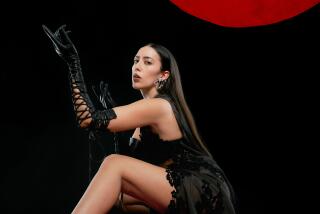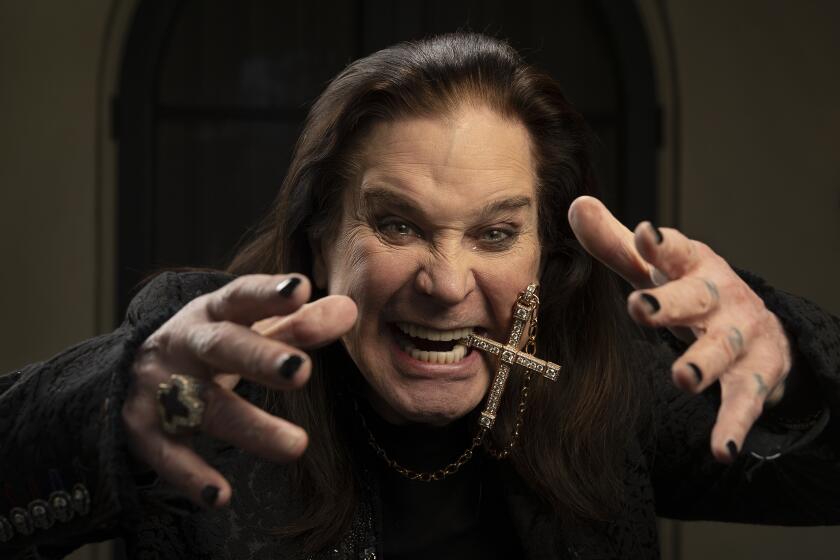South African Music Hints at Gospel, Jazz
- Share via
NEWARK, N.J. — The rich, infectious singing style of Thokoza may have an exotic name-- ingom’esbusku --but the South African harmonies are familiar to American music lovers.
The four women who make up Thokoza (Zulu for happiness) are accompanied by traditional drums, and the band Bayeza (they are coming) which re-creates the bouncy, guitar-driven sound of South Africa’s black townships.
The result, punctuated by distinctly African ululations and the “click sounds” of the Zulu language, hints of the call-and-response style of American gospel, the emotion of blues and the energy of jazz improvisation.
The group once shared the bill with a gospel quartet led by a staid 78-year-old minister who at first looked askance at Thokoza’s brightly colored African costumes, recalled Thuli Dumakude, the group’s lead singer.
“After we sang, the reverend came and said, ‘Wow! Was that gospel? I couldn’t tell because of the language.’ But he heard the spirit,” she said. “The music broke the ice; we started relating to each other.”
Ingom’esbusku (night music) is gaining a new, international audience thanks in part to Grammy-winning Ladysmith Black Mambazo, the South African group that recorded the “Graceland” LP with Paul Simon.
At a recent concert in Newark, the singers wore black dresses with splashes of brightly patterned cloth tied around their waists and hair, and white canvas shoes that flashed like semaphore as they moved in quick, high steps.
“South African dancing is more like the sound of the drum,” said Dumakude. “The footwork is just complementing the drums.”
Dumakude, whose quiet speaking voice contrasts with her soaring, emotional singing, is the only Thokoza member born in South Africa. Linda Carter is from Orange, N.J.; Amma Oloriwaa and Ghanneiyya Green were born in New York.
“South Africans will come backstage to talk to the performers. They ask, ‘Which part of home are you from?’ And the people say, ‘I’m from Brooklyn,’ ” said Welcome Msomi, Dumakude’s husband and Thokoza’s producer.
“There are some of us who only came in 1979, and there are others who have been here for hundreds of years. But still, we are Africans,” said Msomi, who occasionally adds a bass line to Thokoza and writes some of its songs.
“Even though we can’t trace our roots, maybe by singing we can hear where we came from,” Oloriwaa said. “If you have a deep, guttural gospel sound, then maybe your people came from South Africa. If it’s high, maybe it’s West Africa.”
Thokoza’s repertoire includes traditional African songs as well as original pieces that often call for social and political change in racially torn South Africa.
The group recently completed several concerts on the East Coast--including performances at New York’s Town Hall and Atlanta’s Symphony Hall--with a Gambian balladeer, a gospel choir and Puerto Rican plena and bomba band in a show called the African Heritage Tour. Thokoza also performed at 25 elementary and high schools in the New York area last year, and on college campuses in Missouri, Illinois and California.
The group grew from the theater that Dumakude and Msomi founded in 1979 in the largely black Bedford-Stuyvesant section of Brooklyn. Msomi started the original IZulu Theater in 1965 in Durban, South Africa. In 1977, the Royal Shakespeare Company brought IZulu to London to stage “Umbatah,” which Msomi describes as a Zulu version of Shakespeare’s “Macbeth.”
“Umbatah” later played at the Spoleto Festival in Charleston, S.C., where it was seen by producers who offered to stage it in New York.
“When the show closed (in New York), I made up my mind that I was going to start up a branch of the theater in the United States,” Msomi said. “I love the challenge.”
Msmoi and Dumakude began with Zulu dance and language classes, nurturing an interest in African culture among U.S. blacks that allowed the South African couple to build a company. The plays they produced often included song and dance.
“As we were growing, people began demanding to hear more of the music,” Msomi said. “Then, when Paul Simon came out with ‘Graceland,’ people started to discover South African music. People started to demand South African music, then Thokoza started to develop.”
“Graceland” was named Album of the Year in 1986, and Ladysmith Black Mambazo went on to capture its own Grammy for best traditional folk album, “Shaka Zulu,” a year later.
Dumakude had at first planned to find other South Africans for Thokoza. In South Africa, she was taught that blacks in the United States were not African, and found that many black Americans were unaware of, or unwilling to acknowledge, their ties to her home.
More to Read
The biggest entertainment stories
Get our big stories about Hollywood, film, television, music, arts, culture and more right in your inbox as soon as they publish.
You may occasionally receive promotional content from the Los Angeles Times.










